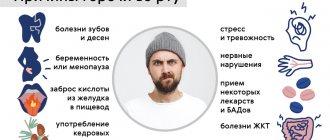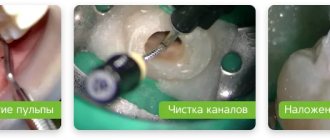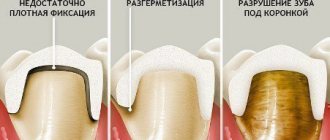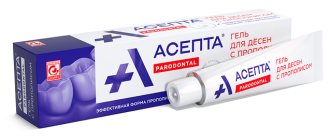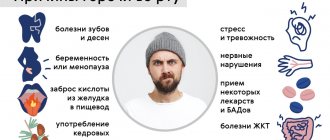Bitterness in the mouth may indicate problems with the digestive system. Severe or persistent bitterness in the mouth is a reason to consult a doctor.
From time to time you may experience an unpleasant bitter taste in your mouth. As a rule, this is due to a sudden release of bile into the gastrointestinal tract. In this case, some bile may enter the esophagus and cause a bitter sensation in the mouth.
. Often a bitter taste in the mouth is felt in the morning, since bile can enter the stomach during sleep (especially if you sleep on your left side and dinner included fatty foods).
Bile is a secretion produced by the liver and is necessary for digesting food. The bile duct carries bile from the liver to the gallbladder, which acts as a storage reservoir. During the active digestive phase, bile from the gallbladder enters the duodenum. Some substances have choleretic properties, that is, they increase the production of bile. Eating foods with choleretic properties (for example, pine nuts) can provoke a sharp increase in the flow of bile into the intestines and, as a result, the appearance of bitterness in the mouth. Some medications have the same effect - both medical preparations and traditional medicine (St. John's wort, sea buckthorn oil, etc.).
However, bitterness in the mouth should not be ignored
. Its appearance indicates that not everything is in order with the digestive system. For example, a bitter taste may appear after eating fatty (heavy) foods. Fatty foods stimulate bile secretion. Normally, the secreted bile should not enter the stomach and esophagus, but should be released exactly as much as is necessary for the digestive process in the intestines. The appearance of bitterness indicates that this is not the case. And we need to figure out what caused this. If bitterness in the mouth occurs frequently or persists for a long time, then it is better not to delay a visit to the doctor.
Symptoms
Bitterness in the mouth can manifest itself in different ways, for example:
- after overeating and eating certain foods - indicates the reflux of bile into the esophagus and diseases of the bile ducts,
- aftertaste after taking medications means a disruption of the normal microflora, a negative effect on the liver and the destruction of beneficial bacteria,
- after sports training - speaks of liver pathologies.
Bitterness can occur at different times of the day, after physical activity and during the abuse of bad habits. Often the symptom is accompanied by nausea and vomiting, dizziness, heaviness in the side and abdominal pain, white coating on the tongue and a feeling of bloating, heartburn and belching, dry mouth. At the appointment, you need to inform the doctor in detail about each sign.
First aid
Often, a person who finds himself next to a patient does not know what exactly caused the intoxication and what to do in case of drug poisoning. In some cases, the first symptoms can be noticed only a few hours after taking the drugs. But there are several general rules for providing first aid. They are relevant for all severe cases:
- immediately call an ambulance;
- if a person is unconscious, but there is normal breathing and heart rate, it is necessary to lay him on his side;
- If a person is conscious and less than half an hour has passed since taking the medicine, it is necessary to give him a large amount of water and artificially induce vomiting. To do this, you need to press on the root of the tongue. If you do not know what poisoned a person, there is no need to induce vomiting;
- · After vomiting, give the patient a sorbent.
Drug poisoning. First aid for poisoning.
If a person is in serious condition, breathing slows down, the pulse is difficult to palpate, and artificial respiration must be performed. Remember that inaction can have fatal consequences.
It is necessary to show the emergency medicine packaging to the emergency doctors and describe the person’s condition. If you know that a person took alcohol along with the medicine, also tell the doctors about this.
Which doctor treats bitterness in the mouth?
First of all, bitterness in the mouth is considered as a symptom of gastroenterological disorders, so when the first signs appear, you need to make an appointment with a gastroenterologist.
To make an appointment with a doctor, choose any method:
- call the clinic +7 (495) 103-99-55,
- order a call back,
- leave a request for an appointment using a convenient form on the website:
Often people do not pay attention to bitterness in the mouth, explaining the occurrence of the symptom with overeating, an uncomfortable position in bed and some other reasons.
IMPORTANT! Rarely does anyone think that bitterness in the mouth is a signal indicating the development of serious pathology of the liver and gastrointestinal tract.
If you have been experiencing this symptom for a long time, do not engage in self-diagnosis and self-medication - make an appointment with a specialist at the Kuntsevo Treatment and Rehabilitation Center! An experienced gastroenterologist will collect anamnesis, complaints, conduct an objective examination, and refer you for laboratory and instrumental diagnostics to understand the cause of the pathology.
SIGN UP
Treatment of drug intoxication
The basis of treatment is drug withdrawal. Neurological symptoms are of great importance in diagnosing the condition. The drug and its breakdown products are eliminated through all excretory organs: intestines, kidneys, saliva, sweat glands. The main routes of elimination are the kidneys and liver. Toxins are eliminated from the kidneys quickly enough and are eliminated in the urine. The situation is more complicated with drugs that are eliminated through the gastrointestinal tract.
From the liver cells, the breakdown products of the drug enter the bile and end up with it in the intestines, where they can be reabsorbed and delivered to the liver. This process is called enterohepatic circulation of substances. In some cases, harmful substances are excreted from the intestines along with feces. Circulation can result in toxins remaining in the body for quite a long time. This creates a high load on the liver, provokes the activity of liver enzymes and unpleasant symptoms.
But the entry of drugs and their breakdown products into the stomach, as well as their further movement through the intestines, does not pass without a trace. Peristalsis is disrupted, mucous membranes are irritated, and an imbalance of bacteria occurs. For example, many antibiotics have a detrimental effect on the intestinal microflora. Frequent, prolonged use or an inadequate dose can lead to intoxication. You can speed up their removal with the help of sorbents.
It is important to understand that many mild symptoms of intoxication are an attempt by the body to independently remove excess substances. There is no need to interfere with these processes if they proceed in moderation. It is best to provide conditions under which natural cleansing will occur. For example, with moderate vomiting, you should not resort to the use of antiemetic drugs. You should sound the alarm if your temperature rises above 38.5 °C, uncontrollable vomiting that interferes with fluid intake, signs of dehydration and frequent diarrhea.
Treatment of drug poisoning is carried out using several methods:
- gastric and intestinal lavage (according to indications);
- intravenous infusions to accelerate the elimination of toxins, replenish lost fluid due to diarrhea and vomiting. This technique is appropriate for acute forms of intoxication, in a hospital setting;
- prescribing enterosorbents for internal use to bind and remove toxic substances;
- use of enzyme preparations and diuretics according to indications;
- the use of probiotics and prebiotics to restore normal intestinal microflora;
- vitamin therapy and antioxidant treatment to neutralize free radicals.
For chronic intoxications, outpatient treatment is allowed. But it is important to consult a physician to find out the exact cause of poisoning, adjust the dosage of regularly used medications, or choose an alternative.
In the future, you can cope with the elimination of toxic substances with the help of plenty of drinking, a gentle diet, and enterosorbents. One of the effective drugs to combat intoxication is Fitomucil Sorbent Forte. The product contains a plant sorbent, inulin - a prebiotic that promotes the growth of its own beneficial microflora, as well as live bacteria. The drug accelerates the elimination of harmful substances and improves motility of the gastrointestinal tract. It has a gentle effect on the gastrointestinal tract and does not cause bloating or abdominal pain.
Treatment methods
Basically, the treatment of bitterness in the mouth comes down to taking medications. The specialist selects complex therapy based on the results of tests and instrumental examinations. The gastroenterologist identifies one of three problems:
- Liver disorders. Means are prescribed to stabilize the operation of the “filter”,
- Digestive tract dysfunction. Drugs that affect the digestive system normalize the work
- Uncontrolled bile production. Eliminated by drugs that affect the level of secretion, for example, anticholinergics.
Treatment of postcholicystectomy syndrome
Since PCES is not an independent disease, treatment of the syndrome is always determined by its causes. Not knowing how to properly treat postcholicystectomy syndrome can only aggravate the condition and increase unpleasant symptoms.
The principles of treatment for PCES include two key points:
- collection of anamnesis data - the doctor carefully studies old medical reports and records, paying close attention to preoperative diagnostics and the protocol of the operation;
- eliminating the causes of the syndrome;
- prevention and treatment of suspected complications.
Treatment is mainly based on:
- diet therapy;
- drug treatment;
- surgery (according to indications)7.
Together with comprehensive treatment, these measures can reduce the severity of symptoms of PCES8.
Why do we need to treat bitterness in the mouth?
Since an unpleasant taste in the mouth is a symptom of some pathology, a comprehensive examination is needed, without which it is impossible to establish a diagnosis. Our clinic has the latest equipment for ultrasound diagnostics of the liver and gallbladder, gastroscopy, etc., which help identify the pathological process in a short time. Our own laboratory allows you to get test results within a few hours. It is the quick examination process that attracts many Moscow residents to our clinic, as well as experienced, qualified staff ready to help every patient.
Expert advice
When there is bitterness in the mouth, self-medication is the most dangerous. It is believed that the main cause of the symptom is liver disease. Patients begin to make compresses on their own and drink herbal decoctions. Instead of relief, complications occur. The patient is sent to the hospital with severe pain, intoxication, peritonitis, etc. These are the consequences of trying to make an independent diagnosis. It turns out that the cause of the bitterness in the mouth was gallstones. A person independently drinks choleretic decoctions, stimulates the migration of stones, which safely get stuck in the duct and cause an acute attack. Instead of having the crystals crushed under medical supervision, the patient goes straight to the operating table.
Dzhgarkava Tea Gochaevna
Therapist-cardiologist Experience 5 years
There are other, no less dangerous cases. To get rid of bitterness in your mouth, you need to go to the doctor and cure the detected diseases. This is the only right decision.
Diagnostics
You can start diagnosing with a consultation and examination with a doctor. To do this, you need to contact a therapist, gastroenterologist, hepatologist or dentist. The doctor will conduct a survey and refer the patient for examination.
Photo: okfoto / freepik.com
During the consultation, the doctor needs to describe in detail the existing symptoms, tell how often and under what circumstances bitterness appears. Information about lifestyle, diet, and existing diseases will be useful.
For diagnosis, the following studies are carried out:
- Duodenal sounding. If a malfunction of the biliary tract is suspected, portions of bile are taken using a probe for bacteriological examination, and the rate of excretion of bile into the duodenum is also assessed.
- Gastroscopy (EGDS, FGDS) is a study using a gastroscope. Allows you to examine the mucous membrane of the digestive organs and do a biopsy (take tissue samples for laboratory testing).
- Ultrasound of the liver, gall bladder and other organs. It is carried out to assess the size and presence of changes in internal organs.
- Lab tests. If diseases of the digestive organs or biliary tract are suspected, a stool test is prescribed. A biochemical blood test is performed if cholecystitis is suspected. A test for hCG and sex hormones, as well as a serological test if viral hepatitis is suspected, can also be performed.
Folk remedies
Bitterness in the mouth may be due to medication
In cases where no serious pathologies are found, folk recipes will help get rid of the feeling of bitterness in the mouth.
- Flax seed. To prepare the drink, take a quarter cup of ground flaxseed, add half a liter of boiled water and leave. Drink half a glass in the morning.
- Vegetable juices. Freshly squeezed juices from potatoes, carrots and celery increase the secretion of saliva and thereby help with bitterness in the mouth.
- Decoction of calendula flowers. For half a liter of boiling water you need to take 20 grams of calendula flowers, bring to a boil and leave. It is recommended to take 2 glasses per day for a month.
- Sunflower oil. Keep the slightly heated oil in your mouth for several minutes. The feeling of bitterness should disappear.
- Corn silk. A decoction of corn silk has choleretic properties, it contains fiber, B vitamins, and vitamin E. It helps cleanse the body, get rid of bad breath and stimulate the production of digestive enzymes.
- Rose hip decoction. Rosehip decoction is a choleretic agent and a real vitamin bomb. This drink not only relieves the feeling of bitterness in the mouth after eating, it also stimulates the immune system.
The choice of treatment for bitterness in the mouth depends on the disease that caused this sensation. No matter how harmless this symptom may seem, the cause of its occurrence can be quite serious, so you should not neglect this signal from the body and listen to it: get examined and begin treatment.
Treatment with juices and drinks
To quickly get rid of bitterness in the mouth, you need to switch to proper nutrition. At the same time, it is useful to consume the following juices:
| Juice | Peculiarities |
| Cucumber | It is recommended to take it when the body is intoxicated. It destroys and removes parasites, speeds up metabolism. The drink helps with poisoning, removes the unpleasant aftertaste |
| Carrot | Normalizes intestinal function, restores the microflora in it. It is also prescribed to protect the liver, as it prevents liver obesity. The juice is recommended for use for gastritis, cholecystitis, and helminthic infestations. |
| Beetroot | They can treat bile stagnation. It stabilizes blood cholesterol levels and speeds up metabolism. The drink contains a large amount of antioxidants and pectins, which cleanse the intestines and remove not only toxic substances, but also rotting food debris. Doctors advise mixing beet juice with carrot juice or simply diluting it with water. In concentrated form, the product irritates the mucous layers of the stomach |
| Potato | It contains a lot of starch, protein, fiber, vitamins and minerals, and organic acids. Due to this, it is used to normalize carbohydrate metabolism and improve intestinal function. |
| From celery and parsley | The drink not only removes bitterness in the mouth, but also restores the functioning of the gallbladder. Foods prevent fatty liver. The cocktail speeds up metabolism and removes food debris that has begun to rot from the intestines. |
| Fruit | It is recommended to mix fresh juices from orange, lemon, and apples. The result is not only a tasty, but also a healthy mix. You can prepare drinks using a juicer in a few minutes. The product must be used immediately - fresh. |
You can also prepare another healthy drink. Requires 1 large citrus fruit (for example, lemon).
Recipe:
- grind the fruit through a meat grinder;
- transfer the pulp into a glass container;
- add a glass of linden honey and 50 ml of olive oil (exclusively unrefined);
- stir with a wooden spoon.
The workpiece should be stored in a dark and cool place (a refrigerator will do). You need to take the product every time an unpleasant taste appears in your mouth. Allowed to eat 1 tsp.
Another traditional drink will also be beneficial - jelly. But it gets rid of bitterness only with certain preparation. Required:
- pour 1 tbsp. l. flax seeds with boiling water;
- wait until the product infuses and cools.
Drink half a cup twice a day (no straining required).
Causes of bitter taste in mouth
Bitterness in the mouth can appear due to diseases of the digestive system, teeth and gums, due to changes in hormonal levels, taking certain medications and for other reasons (Fig. 1). At the same time, the accompanying symptoms and conditions under which a person feels a bitter taste in the mouth will be different.
Figure 1. Some causes of bitterness in the mouth. Source: MedPortal
Poor quality food
Foods cooked with a lot of oil, fat or burnt can cause a bitter taste in the mouth. Sometimes the bitter taste is associated with drinking black coffee or very strong tea. It can also appear if a person has eaten sunflower seeds or nuts. The bitterness will go away if you drink cool water, but a slight unpleasant aftertaste may persist for a while. If the bitter taste comes from food, there will be no other symptoms (pain, indigestion).
Age-related changes
With age, a person's taste perception gradually changes. Older people are less able to discern tastes, but may still experience bitterness. This is associated with a number of other health changes, for example, decreased saliva production, dry mucous membranes, and a gradual deterioration in oral health.
Smoking
If a person smokes frequently, they perceive the taste of food less well, and this can increase the bitter taste in the mouth. Also, bitterness in the mouth of smokers may be associated with the taste and smell of tobacco smoke. The resins contained in it linger on the mucous membrane of the oral cavity and settle on the surface of the tooth enamel. This is the cause of bad breath, deteriorating dental health and the associated persistent bitter taste. You can beat it with chewing gum or mints, but it is better to quit smoking or at least reduce the number of cigarettes you smoke.
Pregnancy
In the first trimester, bitterness in the mouth may appear along with other symptoms of toxicosis. It usually worsens with nausea or after vomiting. Fluctuations in estrogen levels can affect the perception of tastes. Cholestasis of pregnancy can also cause bitterness. This is a relatively rare syndrome that develops in the third trimester and is characterized by pruritus and cholestatic jaundice. Cholestasis in pregnancy resolves after childbirth and is considered a relatively harmless condition, but if symptoms appear, you should inform your obstetrician-gynecologist.
Functional dyspepsia
Functional dyspepsia is a disorder in which a person does not have severe diseases of the digestive system, but experiences pain, early satiety and a feeling of fullness after eating, and a burning sensation in the upper abdomen. In this condition, the feeling of bitterness occurs due to slow digestion of food. It may be accompanied by abdominal cramps and other unpleasant sensations. Functional dyspepsia is associated with a number of factors, including stress, smoking, heredity, and recent infectious diseases. You can relieve the bitter taste in your mouth by drinking water with lemon juice. If the condition does not go away or the pain intensifies, diarrhea, vomiting or other severe symptoms appear, you should immediately consult a doctor.
Hepatitis
Bitterness in the mouth is the initial symptom of hepatitis and accompanies liver inflammation. In this case, the bitter taste appears in the morning, immediately after waking up or 30-60 minutes after eating. This is accompanied by heaviness in the right hypochondrium, pain, nausea and vomiting containing bile. With toxic hepatitis, symptoms appear for a short time and disappear after starting treatment. With viral hepatitis, bitterness in the mouth persists almost constantly.
Pathologies of the gastrointestinal tract
If food digestion is impaired, an unpleasant taste appears in the mouth. The sensation of bitterness may occur due to a change in taste perception. It occurs, for example, with pancreatitis and may be accompanied by vomiting and the appearance of a yellow or grayish coating on the tongue. A common cause of bitterness in the mouth is gastroesophageal reflux disease (GERD). In this disease, stomach contents (stomach juice and food particles) regularly back up into the esophagus, causing heartburn and a bitter taste in the mouth (video 1).
Video 1. Symptoms of gastroesophageal reflux disease.
If a person has chronic gastritis or duodenitis, a bitter taste appears when he violates the recommended diet. In diseases of the digestive system, a feeling of bitterness in the mouth is always associated with food intake (appears some time after it).
Biliary system damage
A bitter taste may appear in the mouth due to cholelithiasis, cholecystitis, cholangitis and other diseases of the biliary system (gall bladder and bile ducts). At first, bitterness may appear only after drinking alcohol, fatty or fried foods.
“Burning in the mouth, tongue covered with a yellow coating, discomfort, and so on. In 95% of cases, this is due to the reflux of bile from the duodenum into the stomach. In the stomach, this bile is mixed with hydrochloric acid, thrown into the esophagus and then into the oral cavity.”
Karasev I. A., candidate of medical sciences, gastroenterologist, surgeon, endoscopist.
Without treatment, the condition will gradually worsen. The bitter taste will bother you more often and last longer. Along with it, nausea, pain in the hypochondrium on the right side, and stool disorders may occur. The feeling of bitterness becomes permanent if a severe inflammatory disease of the gallbladder or bile ducts develops (cholangitis, cholecystocholangitis, cholecystitis and others). Also among the possible causes are biliary dyskinesia, due to which the outflow of bile is disrupted, and cholelithiasis. Less commonly, the disorder is associated with parasitic liver disease (giardiasis, opisthorchiasis or echinococcosis).
Dental diseases
The feeling of bitterness can be caused by the presence of tartar, caries, gingivitis or other dental problems. There are usually other symptoms:
- toothache;
- enamel sensitivity (reaction to cold or hot, sweet, sour);
- bleeding gums;
- tooth mobility;
- gums look red or swollen;
- There is a noticeable plaque on the enamel that cannot be removed by regular teeth brushing.
Problems with the health of teeth and gums may be associated with xerostomia, a condition in which insufficient saliva is produced and the mouth constantly feels dry. This increases the risk of tooth decay and gum disease, and causes an unpleasant odor in the mouth, which is perceived as bitter. Xerostomia can occur due to smoking, mouth breathing, aging, diabetes, or autoimmune diseases. This condition requires consultation with a dentist.
Sometimes bitterness in the mouth appears after dental treatment. This may be due to the use of certain medications or materials, or the installation of dentures, braces and other structures in the mouth. If the bitter taste does not go away or persists for several days, you should contact your dentist.
Neurological disorders
The mouth may taste bitter due to damage to the brain structures that process taste information. In this case, taste perception is disrupted: for example, sour foods may seem sweet, salty foods may seem sour, and a person may not perceive some tastes. This can occur after a traumatic brain injury or stroke. Sometimes taste disturbances are associated with Alzheimer's disease and other age-related diseases in which neurodegenerative processes occur.
Complications of pharmacotherapy
There are more than 250 types of medications that can cause taste disturbances, including the appearance of bitterness in the mouth. This can happen if the drug affects the taste buds of the brain, if part of it remains in the saliva and changes its taste, if the drug suppresses the microflora, which is why fungal diseases develop. Among the drugs that can cause a bitter taste in the mouth:
- antibiotics;
- medications for arrhythmia, diuretics, statins and other drugs used for cardiovascular diseases;
- drugs used in chemotherapy;
- muscle relaxants, migraine medications and other neurological drugs;
- neuroleptics, sedatives, hypnotics, antidepressants;
- non-steroidal anti-inflammatory drugs;
- bronchodilators;
- antihistamines;
- antiviral drugs;
- nicotine replacement therapy products.
Rare causes
Sometimes bitterness in the mouth becomes a symptom of endocrine disorders: diabetes mellitus, hypothyroidism, hypocortisolism and others. It can accompany some cancers and respiratory diseases. Rarely, the cause is an infection of the salivary glands. A bitter taste may occur in cases of poisoning due to accidental ingestion of a toxic substance. In all these cases, the appearance of bitterness is accompanied by other symptoms of the underlying disease.
Help before diagnosis
Even if a diagnosis has not yet been made, several measures can be taken to alleviate the condition:
- Adjust your diet, remove fatty and fried foods, eat more often and in small portions.
- Stop smoking or reduce the number of cigarettes you smoke.
- Limit alcohol consumption.
- Drink more water.
Monitor the quality of oral hygiene. You should brush your teeth twice a day, as well as use mouthwash and floss. If you have problems with your teeth, you need to visit a dentist.
Photo: goffkein/freepik.com
Important! You should not try to use folk remedies or treat yourself - this can be dangerous. If a bitter taste in your mouth appears regularly, you should consult a doctor and get recommendations for treatment.
